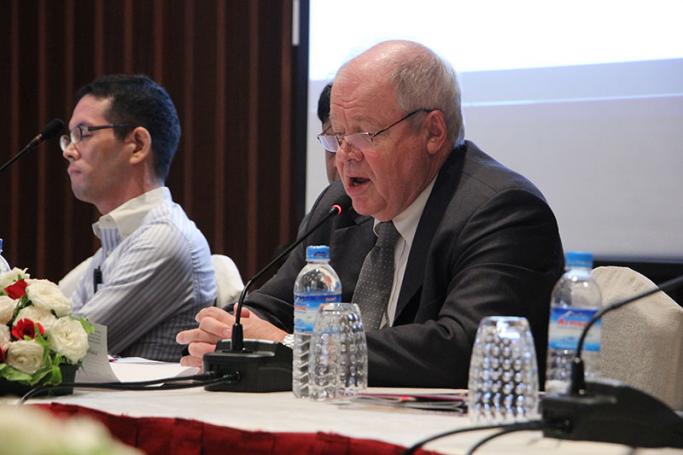A top logistics expert has said Myanmar must work out customs bonding agreements with neighbouring countries to boost trade and transport incomes that could accrue from regional groupings like BIMSTEC.
Speaking to Mizzima on the side-lines of a seminar on 'Myanmar in BIMSTEC' logistics specialist and consultant Paul Apthorp said Myanmar is strategically located between South and South-east Asia.
"It is going to the biggest beneficiary of regional groups like BIMSTEC, but only if got into customs bonding agreements with India, Bangladesh, Thailand and other countries," Paul Apthorp told Mizzima in an exclusive interview.
"See how trade between Thailand and China exploded through the roof after the two countries arrived at a customs bonding agreement, said Paul Apthorp, "That could happen if Myanmar worked out similar agreements with its neighbours."
Customs Bonding agreements involve a contract used for guaranteeing that a specific obligation will be fulfilled between customs and an importer for any given import transaction. The main purpose of a customs bond is to guarantee the payment of import duties and taxes.
Paul Apthorp said one option for Myanmar was to sign into the Transports Internationaux Routiers(TIR), as India has just done or China has done before.
India ratified the TIR or International Road Transports (TIR) Convention, IRU this year.
The multilateral international transit treaty—Customs Convention on International Transport of Goods under cover of TIR Carnets—is also referred to as the TIR Convention and functions under the auspices of the United Nations Economic Commission for Europe (UNECE).
It will help India access transnational multi-modal connectivity and play an important role in the proposed transportation architecture in the region and beyond with the backdrop of India recently ratifying the trade facilitation agreement (TFA) of the World Trade Organization (WTO).
India became the 71st signatory to this international transit system, designed to facilitate the seamless movement of goods throughout these countries in Asia and Europe. Interestingly, the two countries which signed TIR before India were Pakistan (2015) and China (2016).
You are viewing the old site.
Please update your bookmark to https://eng.mizzima.com.
Mizzima Weekly Magazine Issue...
14 December 2023
Spring Revolution Daily News f...
13 December 2023
New UK Burma sanctions welcome...
13 December 2023
Spring Revolution Daily News f...
12 December 2023
Spring Revolution Daily News f...
11 December 2023
Spring Revolution Daily News f...
08 December 2023
Spring Revolution Daily News f...
07 December 2023
Diaspora journalists increasin...
07 December 2023
Myanmar Suu Kyi supporters blocked from campaigning in Thailand












